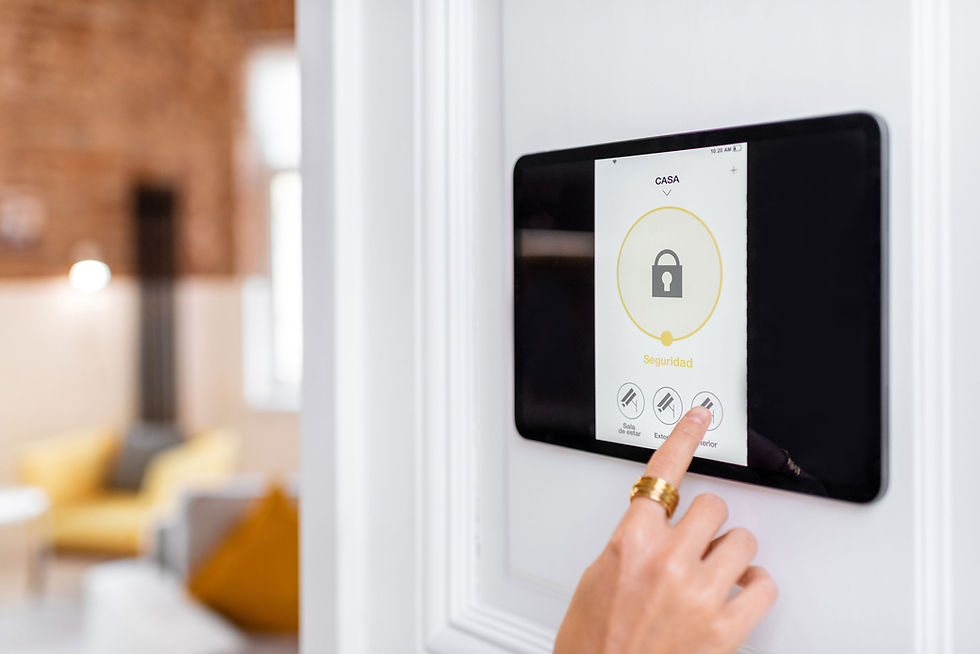Smart Homes: The Future of Home Automation
- InnovateInsider

- Jun 5, 2023
- 3 min read
Home automation has come a long way in recent years, with technology transforming the way we live and interact with our homes. From controlling the temperature and lighting with a single device to automating routine tasks like locking doors and adjusting the thermostat, home automation has made our lives more convenient and efficient.
One of the biggest advantages of home automation is the ability to control your home from anywhere, at any time. With the help of smart devices and mobile apps, you can manage your home's temperature, lighting, security, and entertainment systems from your smartphone or tablet. This means you can easily check in on your home and make adjustments from the office or while on vacation.
Another advantage of home automation is energy efficiency. By automating routine tasks like turning off lights and adjusting the thermostat, you can significantly reduce your energy consumption and lower your monthly bills. This not only saves you money, but it also helps to reduce your carbon footprint and conserve natural resources.

Home automation also offers improved security. With smart locks, cameras, and motion detectors, you can monitor your home and keep your family safe. You can receive alerts when doors are opened or when there is movement in your home, giving you peace of mind while you're away.
One of the most exciting aspects of home automation is the integration of virtual assistants like Amazon's Alexa or Google's Assistant. With the ability to control your home with voice commands, you can enjoy hands-free control of your home's lighting, temperature, and entertainment systems. This makes your home more accessible and easier to manage, especially for those with disabilities or mobility issues.
Despite the many benefits of home automation, there are some challenges to consider. One of the biggest challenges is compatibility. With so many different devices and systems available, it can be difficult to ensure that all of your home automation devices work together seamlessly. Additionally, the cost of setting up a smart home can be high, especially if you're starting from scratch.
Another challenge is security. With the increasing number of connected devices in our homes, the risk of cyber threats and hacking is also increasing. It's important to take steps to secure your home automation system, such as regularly updating your devices and software and using strong passwords.
Another important aspect of home automation is the integration of smart appliances. From refrigerators that can keep track of what's inside to washing machines that can be controlled remotely, smart appliances are making our homes more efficient and convenient. For example, a smart refrigerator can keep track of what food items you have and when they expire, and even order groceries for you when you run low on a certain item. This not only saves you time, but it also helps to reduce food waste.
Smart homes are also helping to improve home entertainment. With the integration of smart TVs, sound systems, and gaming consoles, you can create a fully immersive home entertainment experience. For example, you can use your smartphone to control your TV, adjust the volume, and even change channels. With the ability to access a vast library of movies, TV shows, and music, you can enjoy a home entertainment experience that's tailored to your preferences.
Another benefit of home automation is the ability to monitor and control your home's environment. With smart sensors, you can monitor the temperature, humidity, and air quality in your home. This not only makes your home more comfortable, but it also helps to improve your health and well-being. For example, you can use smart sensors to monitor the air quality in your home and receive alerts when it's time to change the air filters.
Finally, home automation is helping to create more sustainable homes. With the ability to monitor and control your energy consumption, you can reduce your carbon footprint and make your home more environmentally friendly. For example, you can use smart sensors to monitor your energy consumption and receive alerts when you're using more energy than normal. This helps you to identify areas where you can improve your energy efficiency and make your home more sustainable.

In conclusion, home automation is transforming the way we live and interact with our homes. With its ability to improve convenience, efficiency, and sustainability, home automation is an investment worth considering. Whether you're looking to improve your home entertainment, energy efficiency, or security, home automation has something to offer. So if you're ready to take your home to the next level, consider investing in home automation today.



Comments